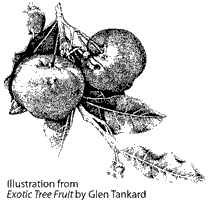
ACEROLA
SCIENTIFIC NAME: Malpighia glabra
FAMILY: Malpighiaceae

Most people know that the Acerola Cherry of the Malphighia genus, common name Barbados Cherry, has a very high Vitamin C content. Recent research at the University of Florida has established that the Acerola has a Vitamin C content of between 1000 to 4000 mg Vitamin C per 100 grams of fruit. This is much higher than any other fruit, and it has been established that one Acerola Cherry should provide the average daily requirement of an adult for Vitamin C. Daily requirement is 40 mg if in good health.
We all know how important Vitamin C is to prevent fatigue and many ailments and diseases. Did you know that each cigarette you smoke uses 25 mgs of Vitamin C? So unless you eat Acerolas or Vitamin C tablets you should avoid cigarettes.
Recent research indicates that increased Vitamin C intake during the summer months can help to overcome heat fatigue. As the Acerola can crop from November to April it could be a tremendous aid to better health, well-being and vitality in our hot humid summer.
Acerolas do well in a fairly wide range of climatic conditions. The plants are frost-tender when young but can produce fruit when two years old. No serious insect pests attack the tree. The fruit ripens in a month from flowering and four crops a year are usual. Several varieties are sweeter than others but the tarter the fruit the more Vitamin C it contains.
Acerolas contain plenty of Vitamin A, some B and plenty of minerals. Most fruits and vegetables lose their Vitamin C when cooked, but research reveals that this does not happen with Acerolas, so you can make jellies and cordials for the winter. Frozen Acerola Juice was found to retain 85% of its original Vitamin C after eight months of freezing.
The Acerola is a small, pretty tree. Suggest planting where the birds might leave it for you to enjoy. Best grown from cuttings as seed germination is poor.
DATE: July 1987
* * * * * * * * * * * * *
